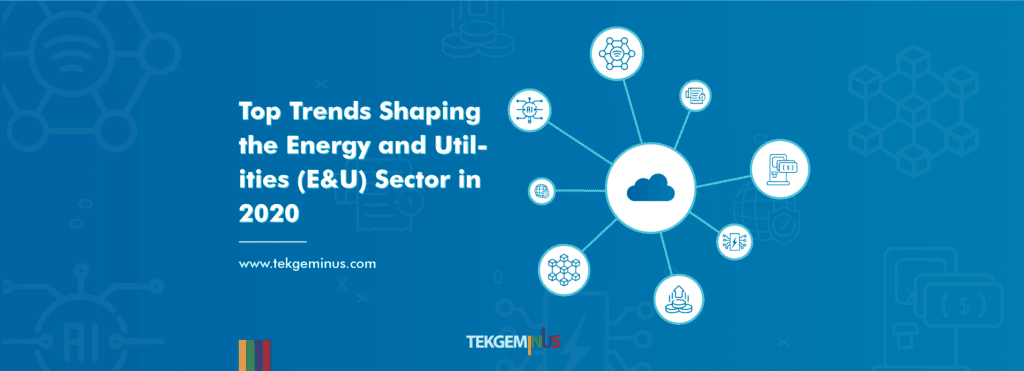It is commonly said ‘Only thing that is constant in life is change’ and the adage also applies to the utility industry that is witnessing a change at an unprecedented pace. TekGeminus has served a variety of utility customers (predominantly in the B2B vertical) for the last 25 years and has been an integral part of the evolution. There is more power in the hands of the customers and the cloud has become an inseparable part of the utility industry. In this blog, we deep dive into the top trends in the utility industry.

Cloud-optimized Customer Platforms for faster M2C (Meter-to-Cash)
Utility providers across the world are on the constant lookout to enhance customer experience whilst keeping a watchful eye on their expenses. Be it retail customers or commercial customers, major aspects related to customer service still remain the same. There is a shift to integrated billing solutions that are simple, scalable, agile and have the essentials of utility M2C (Meter-to-Cash).
Hybrid-cloud solutions offer the right mix of on-premise private cloud and public cloud services. Sensitive and private information about customers can be stored on the on-premise cloud whereas not-so sensitive information can be a part of the public cloud.
At TekGeminus, we firmly believe that Oracle Utilities Customer Care and Billing (CC&B), a highly-scalable CIS (Customer Information System) has the potential to positively impact the utility industry in a big way. Oracle CC&B is designed to meet the needs of different utilities such as electric, gas, and water; which essentially means that there is ‘minimal’ learning-cycle involved when scaling across different utilities.
As Oracle CC&B handles every aspect of the customer lifecycle, there is immense potential to bring positive changes at every step thereby impacting the overall customer experience. It addresses the changing needs of residential, commercial, and industrial customers.
Cloud-based customer platforms like Oracle CC&B and others enable utility companies to improve customer service, enhance financial performance, and adapt to the changing needs of the industry.
In 2020, we foresee more utility providers taking the ‘cloud’ route to enhance their services for building agility and enhancing every aspect of customer experience.
Digitization will take Center-Stage
Digital technologies, including automation using AI (Artificial Intelligence), ML (Machine Learning), IoT (Internet of Things), RPA (Robotic Process Automation), and others will be increasingly used across the E&U (Energy and Utilities) value chain. These technologies will aid in driving efficiency, improving customer service, and facilitating transformation for staying relevant in the rapidly-changing industry.
Mobile applications will not only become an integral aspect of customer service but will also be used for driving revenues from in-app purchases, reducing call-center volume through on-demand communication, and increasing customer retention through R&R (Rewards & Recognition).
Companies will use gamification techniques for the E&U (Energy & Utilities) industry for improving in-app customer experience and improving engagement through hyper-personalization.
Increasing investments to combat cyber-security threats
The rapid transformation of the utilities sector will not be a smooth ride, as it has to combat the serious threats to the grid infrastructure, particularly the smart grid. The frequency and sophistication of cyber-attacks can pose serious security challenges to the utility industry.
We expect growing synergies between utilities (e.g. National Grid) and utility companies for strengthening the security across IT/OT (Information Technology/Operational Technology).
Evolving business models enabled by Blockchain
In 2020, we expect utility companies to explore new business models that improve customer experience, incentivize their loyalty, and boost the flexibility of the smart grid. Blockchain, the decentralized and distributed digital ledger will be increasingly used to record transactions. As the records on the blocks are secured through cryptography, it would offer more security enhancements to the utility providers.
Blockchain has the potential to transform the industry, as it will be instrumental in improving the grid efficiency and leading the transformation towards renewable energy. As Blockchain gains wider adoption, the technology will play a key role in shaping the overall transformation of the utilities sector.
These are the major industry trends that will transform the utility sector in a rapidly changing energy sector…



